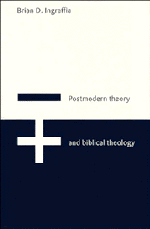Book contents
- Frontmatter
- Contents
- Acknowledgements
- List of abbreviations
- Note on translations of the Bible
- Introduction: postmodernism, ontotheology, and Christianity
- 1 NIETZSCHE'S MOCKERY: THE REJECTION OF TRANSCENDENCE
- II HEIDEGGER'S FORGETTING: THE SECULARIZATION OF BIBLICAL ANTHROPOLOGY
- 6 From the death of God to the forgetting of Being
- 7 Heidegger's theological origins: from biblical theology no to fundamental ontology
- 8 The redemptive–eschatological separation of flesh and Spirit in the epistles of the Apostle Paul
- 9 Inauthenticity and the flesh
- 10 The eigentlich Selbst or the pneumatikos anthropos
- III DERRIDA'S DENIALS: THE DECONSTRUCTION OF ONTOTHEOLOGY
- Conclusion: ontotheology, negative theology, and the theology of the cross
- Notes
- Bibliography
- Index
10 - The eigentlich Selbst or the pneumatikos anthropos
Published online by Cambridge University Press: 01 June 2011
- Frontmatter
- Contents
- Acknowledgements
- List of abbreviations
- Note on translations of the Bible
- Introduction: postmodernism, ontotheology, and Christianity
- 1 NIETZSCHE'S MOCKERY: THE REJECTION OF TRANSCENDENCE
- II HEIDEGGER'S FORGETTING: THE SECULARIZATION OF BIBLICAL ANTHROPOLOGY
- 6 From the death of God to the forgetting of Being
- 7 Heidegger's theological origins: from biblical theology no to fundamental ontology
- 8 The redemptive–eschatological separation of flesh and Spirit in the epistles of the Apostle Paul
- 9 Inauthenticity and the flesh
- 10 The eigentlich Selbst or the pneumatikos anthropos
- III DERRIDA'S DENIALS: THE DECONSTRUCTION OF ONTOTHEOLOGY
- Conclusion: ontotheology, negative theology, and the theology of the cross
- Notes
- Bibliography
- Index
Summary
Anticipatory resoluteness is not a way of escape, fabricated for the “overcoming” of death; it is rather that understanding which follows the call of conscience and which frees for death the possibility of acquiring power over Dasein's existence.
Heidegger, Being and TimeSince the children have flesh and blood, he too shared in their humanity so that by his death he might destroy him who holds the power of death – that is, the devil – and free those who all their lives were held in slavery by their fear of death.
Hebrews 2:14–15In Heidegger, it is the state-of-mind or mood of anxiety which “brings Dasein back from its falling, and makes manifest to it that authenticity and inauthenticity are possibilities of its Being” (BT 235). In a footnote to this passage, Heidegger admits that his analysis of the phenomenon of anxiety is based upon his theological studies:
It is no accident that the phenomena of anxiety and fear … have come within the purview of Christian theology ontically and even (though within very narrow limits) ontologically. This has happened whenever the anthropological problem of man's Being towards God has won priority and when questions have been formulated under the guidance of phenomena like faith, sin, love, and repentance.
Heidegger goes on to refer to Augustine, Luther, and Kierkegaard, but in borrowing from Christian theology, Heidegger has made some significant changes.
- Type
- Chapter
- Information
- Postmodern Theory and Biblical TheologyVanquishing God's Shadow, pp. 151 - 164Publisher: Cambridge University PressPrint publication year: 1995



